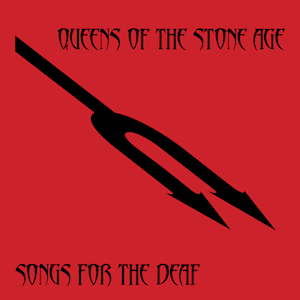CLASSIC REVIEW: Songs For The Deaf By Queens Of The Stone Age

April 10, 2017
On August 27, 2002, Queens of the Stone Age released their third studio album, Songs For The Deaf.
With the inevitably quick-approaching release of Queens of the Stone Age’s 7th studio record, it’s important to acknowledge where the band started coming into its own. For this, one could look nowhere better than the critically acclaimed Songs For The Deaf. Helmed by ex-Kyuss guitarist Josh Homme, who is backed by ex-Kyuss bassist Nick Oliveri, and Foo Fighters frontman and ex-Nirvana drummer Dave Grohl on drums, there could be no better lineup for such down and dirty hard rock. Released during a time where other guitar rock genres like post-grunge were reaching peak popularity, thusly becoming increasingly sterile and played out, Songs For The Deaf was a breath of fresh air for the general public. It consisted of extremely riff heavy and diverse rock tunes, from the jangly almost comedic ‘Another Love Song’, to the Straightforward rock and roll single ‘No One Knows’, to the heavy metal opening track ‘You Think I Ain’t Worth A Dollar But I Feel Like A Millionaire’.
 Songs For The Deaf official cover art
Songs For The Deaf official cover art
‘You Think I Ain’t Worth A Dollar But I Feel Like A Millionaire’ really knocks you into gear for this album. It starts with the sound of somebody getting into their car and turning on the radio, setting up the radio theme for the rest of the album. From there the drums and riff for the first track start and sound as though they’re coming through the car’s speakers. This effect is quickly put to rest, as Oliveri enters screaming the song seems to rip through the speakers right into your ears.
The album continues to the second track and first single, ‘No One Knows’, a song that seems to be both about enslavement and love. With strong imagery Homme, who is now leading the vocals, talks of “some rules to follow” and “these pills to swallow”, and of a journey “through the desert of the mind with no hope”. This transitions into the third track ‘First It Giveth’, introduced by a Spanish-speaking radio host. ‘First It Giveth’ is driven by Homme’s falsetto and chest voice dichotomy, with which he sings of something being “giveth” then “taketh away”, and seems to be speaking of love.
Right as the third track ends, the fourth track begins. ‘A Song For The Dead’ is a hard-hitting rock song featuring Grohl’s pounding drums and singer Mark Lanegan leading the vocals. This track ends with a driving jam, which is immediately mirrored by the soft intro to the fifth track ‘The Sky Is Fallin’’. This cessation doesn’t last long, as the song quickly crescendos to a heavy distorted riff-lead tale of depression, emptiness, and nihilism.
Following the radio theme, the driver of the proverbial car switches channels on their proverbial radio until they rest on the “all death metal, all the time” station. This leads to ‘Six Shooter’, a short song about unbridled rage screamed by Oliveri.
Next, ‘Hangin’ Tree’ brings back Lanegan to sing over some softer, but still dirty riffs. From here, the album’s eighth track and second single ‘Go With The Flow’ busts in without even knocking. A song about moving on, it seems to hypocritically follow the same basic chord progression for the whole song. Despite this, the choruses are specifically differentiated with Homme’s proclamation that he can indeed “go with the flow” (and one note change in the chord progression).
The driver frantically turns the tuner to a different channel, leading to the ninth track, ‘Gonna Leave You’ sung this time by Oliveri. This song seems to mimic ‘Go With The Flow’s message of moving on, but in a much more forceful and even adversarial way, ending with Oliveri saying “I don’t need you”.
The next track, ‘Do It Again’ brings Homme back to the front to sing about a stray lover, and trying to make the most of the situation. This leads the album back into the radio, which seems to be imploding in a sense. Stations are bleeding into each other and the tuning finally lands on a station where the host is talking about falling “into a love that has to be designed by the lord”. This is followed fittingly by ‘God Is In The Radio’, a song which seems to mimic or satire Christian rock lyrically, but is conversely dark and brooding musically. The song ends with a guitar that sounds like a train in a long tunnel, with echoes of the upcoming track ‘Another Love Song’.
‘Another Love Song’, sung by Oliveri, is about a relationship that seems so trite to dub it all “just another love song”. Though, the lyrics do not seem to reflect this flippancy, as the ups and downs of this relationship are very extreme. After the song has ended, an ambiguous sounding radio host introduces their station, WOMB, and refers to listeners as their “pets”.
This leads into ‘Song For The Deaf’, introduced by this host saying “that is, for you”. This track is ceaseless and almost terrifying. Folly made by guitars and vocals alike mixed with choir elements create an atmosphere of horror. The lyrics, sung by Homme and backed by Lanegan, tell of being trapped in one’s self, alienated from the world unwillingly.
The album concludes with the final track ‘Mosquito Song’. What first seems to be about the vampiric insect, devolves into a tale of cannibalism and sacrifice. The song is very subtle, and contrary to the rest of the album consists of only acoustic instruments, including orchestral elements, and ends with a big band orchestral arrangement that is both heavy and dark, including a flamenco guitar solo by Alain Johannes, before it decrescendos into one last verse-chorus pairing as the album ends.
Songs For the Deaf’s production is masterful and captures the sound of each song individually while still keeping a consistent red feel throughout the entire album. Every extra sound is for a purpose, nothing is superfluous, and everything blends really well. You can hear every instrument perfectly, except for Oliveri’s bass at times, and everything is in your face even though everything has its own space it occupies in the mix. It works well when turned up, but at lower volumes, it still feels full, like it isn’t missing anything.
Overall, I would recommend you check out Songs For The Deaf by Queens of the Stone Age, and if you have already listened to it, listen to it again all the way through in one sit. It’s worth it.




